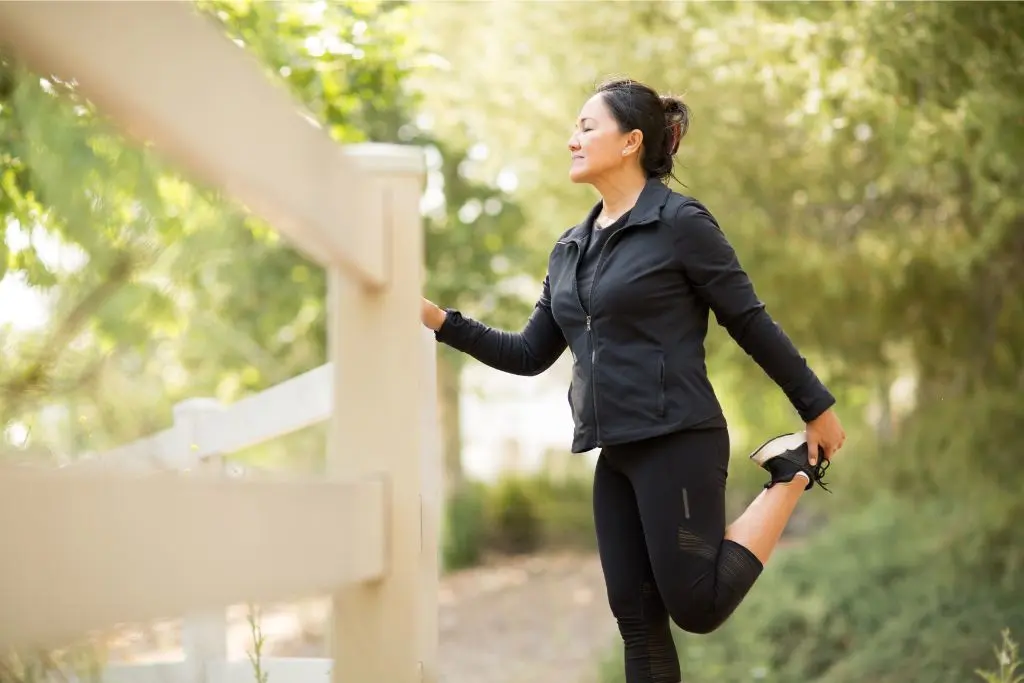10 Ways To Reap The Benefits Of Nature

August 22, 2022

On an average day, how much time do you spend outdoors? If your daily screen time is skyrocketing, a bit more time with Mother Nature could be exactly what you need to boost your health and wellbeing.
According to recent data from DataReportal, the typical internet user spends seven hours a day using the internet - eek - and for most of us, this means spending the majority of the day inside.
On any health and wellness journey, it’s easy to focus on nourishing your body and getting into a regular exercise routine you enjoy, while you might neglect some other pieces of the puzzle like good quality sleep, hydration and time outside. But enjoying nature is one thing you might want to prioritise!
A recent 2020 meta-analysis found that people who are more connected to nature tend to have greater eudaimonic wellbeing. Wondering what exactly that means? The American Psychological Association defines it as the type of happiness or contentment that is achieved through self-actualisation and having a meaningful purpose. People who are more connected to nature also have higher levels of self-reported personal growth, too!

How much time should you spend in nature?
At least two hours each week seems to be the target! According to a 2019 study where researchers examined the association between recreational time in nature and self-reported health and wellbeing, the likelihood of reporting good health and wellbeing became significantly greater with at least 120 minutes in nature.
It didn’t matter whether those two hours are one long session or multiple shorter periods, but hitting 120 minutes every week is key! The benefits only seemed to be for people who met that threshold, and benefits peaked between 200-300 minutes. Beyond that, there was no further gain.
The effects on self-reported health and wellbeing were strong, even across different occupations, ethnicities, socio-economic backgrounds and for people with illnesses or disabilities.
Ways to make nature part of your routine
If you’re tallying up how much time you spend outside each week and it’s nowhere near two hours, here are some simple ideas for an extra boost:
Walk or bike to work or spend your break outside
On a sunny day you’ll get a good dose of vitamin D, and being around trees and greenery can work wonders.
One 2020 research article found that people living near trees reported better mental health, more positive moods and feelings of vitality, a greater sense of connection to the natural world and less mental distress, regardless of age, income and neighbourhood connectedness.
You could also take your laptop or phone calls outside on nice days or suggest walking meetings to your colleagues for some extra fresh air!
Take your workouts outside
If you’re doing LISS (low-intensity steady state cardio) and normally use a stationary bike or treadmill, try heading outside for a walk, bike or jog! Setting yourself a step goal can also be a great source of motivation.
Research from 2012 showed that connection to nature is a significant predictor of many happiness indicators, so even if you’re just doing a warm-up before your workout, a quick cardio blast through a green space or by the water could do you good.
Sweat Trainer Cass Olholm spends a lot of time in the gym but outdoor hikes and runs are some of her favourite parts of the week, and Kelsey Wells loves exercising outdoors for the way it makes her feel peaceful, inspired and grateful.
You could also set up your yoga mat in your backyard or local park for an outdoor Sweat session. Just make sure you choose a stable, dry area!
Find a sport you love
There are plenty of outdoor team sports you could get involved with, such as basketball (Head Trainer Kayla Itsines’ favourite), football, baseball, cricket, netball and tennis. If you’d rather go solo, you could try golf, roller-skating, surfing or stand-up paddle boarding!
Socialise in nature
Instead of catching up with friends over coffee or brunch, change things up with an outdoor walk. 2008 research from the University of Michigan found that walking in nature, compared to urban spaces, can help improve memory performance and attention, too.
Going hiking, trail running or having an outdoor picnic with friends or family are other fun activities when you have more time up your sleeve.

Enjoy nature-inspired art and pictures
That same piece of research also found improvements in memory and attention after people viewed images of nature, so even if you can’t get outside, it could be a great idea to hang some new art at home or change your phone or laptop wallpapers to photos of nature!
Another 2015 study compared the effects of briefly viewing two different city scenes on the sustained attention and task performance of 150 university students. One scene was of a flowering green roof, while the other was a bare concrete roof. Those who viewed the green roof image made significantly fewer errors and reported more consistent responses!
Add some plants to your home
Bring the outdoors inside with a few house plants. Although indoor plants aren’t a substitute for time spent outside, they can uplift your mood, add beauty to your surroundings and be especially helpful if you work from home or spend a lot of time there.
Research has shown that enriching office spaces with plants has a positive impact on perceptions of air quality, concentration and measures of productivity.
Listen to the sounds of nature
Want something calming to listen to on your morning commute or when you’re winding down for bed? Perhaps you’re struggling to focus and need a break to recharge? Find some nature-inspired soundtracks, sit back and relax. Results from one 2018 experiment demonstrated an improvement in attention after hearing natural sounds, compared to urban sounds.

Start gardening
Looking after a garden can be a great active hobby that allows you to spend more time in nature, unwind and bond with loved ones. Even a small balcony or courtyard can be enough space to grow some greens or herbs (added bonus: growing your own herbs can help save you money at the supermarket checkout!).
Research has consistently shown the health benefits of gardening and therapeutic gardens have been a part of many hospital and care facility programs for years! Benefits include improved fitness, mental health, stress, cognitive ablities, social connection and vitamin D levels, to name a few.
If you live in an urban area or are really limited by your space (or you aren’t ready to commit to having your own garden!), see if there’s a local community garden nearby you could be involved in.
Explore with your kids
Got little ones? There are many ways to make time outside a fun adventure for the whole family. Look for birds, animals, insects, flowers or different kinds of plants, or take some sports equipment and enjoy a game together!
Enjoy outdoor dining
Many of us eat all our meals indoors, but it’s a beautiful part of your day to spend outside when you can. You could have your morning coffee or breakfast in the sun, lunch in a park or on the beach, or eat your dinner while watching the sunset. Bliss!
Reaping the benefits from spending time in nature doesn’t have to mean hiking for hours or making a tree-change to live in a forest. There are plenty of easy and affordable ways to make the great outdoors part of your daily feel-good routine.

A more empowered you starts with Sweat, and our editorial team is here to bring you the latest fitness tips, trainer recommendations, wellbeing news, nutritional advice, nourishing recipes and free workouts.
* Disclaimer: This blog post is not intended to replace the advice of a medical professional. The above information should not be used to diagnose, treat, or prevent any disease or medical condition. Please consult your doctor before making any changes to your diet, sleep methods, daily activity, or fitness routine. Sweat assumes no responsibility for any personal injury or damage sustained by any recommendations, opinions, or advice given in this article.
Wellbeing